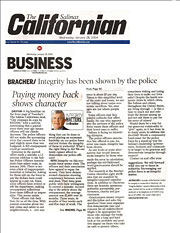Integrity
Matters
January 28, 2004
Integrity has been shown by the police
Paying
money back shows character

 Question: (E-087)
Question: (E-087)
Dear
Jim:
A
big headline on the front page of Tuesday's The
Salinas Californian read "City Overpays Its Cops
by $327,000" with a subtitle mentioning that a payroll
error three year ago means officers will see checks decrease.
The police officers did not make the accounting error
that caused them to be paid slightly more than was budgeted.
A $25 overpayment could go unnoticed.
Someone
in the payroll office made a mistake, a 1.5 percent addition
to the Salinas Police Officers Association's base
salary scale, in January, 2001. There is not even a hint
of inappropriate intention or behavior. Asking for those
still on the force to pay the dollars back could appear
as a pay cut. Since some officers have retired or left
the department, making overpayments collections from them
difficult or impossible. This seems unfair.
These
officers risk their lives for us all the time. With current
concerns about violent crime and safety in our neighborhoods,
is there anything that can be done to avoid placing an
economic hardship on our police force and not violate
the integrity of those in authority? What is the right
thing to do? We certainly cannot afford to demoralize
our police officers?
 Response:
Response:
Integrity
on this economic issue seems clear. The officers and their
association have agreed to repay the money. They have
demonstrated character showing consistency between word
and deed. They have gone public with their willingness
to correct a mistake. According to the article about the
overpayment, the average amount was $2,400 over 36 months.
Three years, 36 months of four weeks each and five days
of work. The error is about $3 per day. Taken to this
simplified level of the costs and losses, we are not talking
about major economic sacrifices. Yet, averages are not
where people live.
Some
officers may face painful cutbacks that affect family.
No one who appreciates the services of the police force
wants these officers and their loved ones to suffer.
Salinas
is facing an interesting dilemma.
The
police officers association has offered to pay. An error
was made. Integrity has been shown.
As
one looks at some alternatives that would demonstrate
integrity by those who made the error in calculation,
perhaps the old-fashioned word graciousness should be
applied.
Our
research at the Bracher Center identifies eight attributes
that are manifest by integrity-centered organizations.
In addition to character, there are honesty, openness,
authority, partnership, performance, charity and graciousness.
Graciousness
means respect and discipline and asks this question: Does
your organization demonstrate care and concern for all
stakeholders? Might it be appropriate for those who manage
the budgets to take a long and hard look at the probable
and positive impact on those who take an oath to protect
others, sometimes risking and losing their lives to make
our lives safer? Despite the harsh economic times in which
cities, like Salinas and others throughout the United
States, are living through – is this a time to reach
out and celebrate the heroes among us and not ask them
to pay for the error of others?
Would
there be a way for our generous community to "give"
again, as it has done in so many areas, to address this
shortfall? Would a community fund-raiser for the police
force be a stand- up way for Salinas's leadership
(government, business and community-at-large) to be gracious
and demonstrate integrity through respect?
Contact
us and offer your suggestions. We will forward what you
say to those in authority. Encouraging our police force
is an integrity matter.